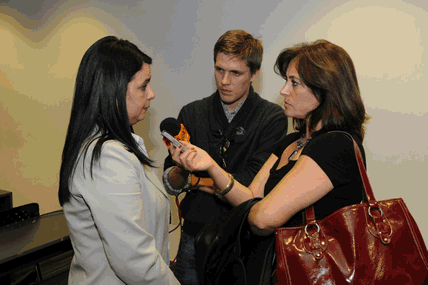
CAF contributes to improve regulations for public services in Uruguay
The financial entity granted non-reimbursable funds to strengthen the national regulatory organizations.
(Montevideo, November 5, 2013).CAF, Development Bank of Latin America, and the Corporación Nacional para el Desarrollo(CND) (National Development Corporation) signed an agreement that will enable the execution of the program Research in Regulation of Public Operators
The initiative will be developed by the Unidad Reguladora de Servicios de Energía y Agua(Ursea) (Regulatory Unit for Energy and Water Services), with the support of the Department of Economics of the Faculty of Social Sciences of the Universidad de la Republica(Udelar).
Gladis Genua, CAF's Director Representative in Uruguay, explained that the objective is to create and disseminate knowledge regarding regulations for public service suppliers at a local level, and help national regulators to adequately comply with their mission.
She commented "the region has made efforts to improve the macroeconomic environment and social indicators such as poverty, however, we continue to have the must unequal region in the world, and with the highest rate of urban population that demands improvements in their quality of life through access to quality basic services, among them, water and energy, and to guarantee that quality, we must have a suitable regulation".
Genua finalized by saying "with this agreement we close the cycle, as on the one hand, we finance the infrastructure that enables the provision of those services, and on the other hand we contribute to strengthen the regulatory entities and we generate native knowledge that improves the supervision framework of these services".
Roberto Kreimerman, Minister of Industry, Energy, and Mining, during the ceremony to sign the agreement noted the importance of subscribing an agreement of this type to strengthen an institution such as Ursea in a scenario where the country has defined a state policy regarding energy, and requires strong institutions and an important connection with the academy to train human resources. In this regard, he applauded the alliance with the university.
At the same time, Daniel Greif, President of Ursea, explained that in a first stage a research process will be developed with the initial participation of six specialists, and later, in 2014, human resources in different disciplines will be trained.
The President stated that the issue of regulation for public operators is not a problem that affects only Uruguay, but rather all the regulatory units in Latin America. In this respect, he highlighted the role of CAF "not only as a financial entity but also as a strategic partner" for its presence and knowledge of the region.
Diego Canepa, Assistant Secretary of the Presidency of the Republic, noted that the regulatory frameworks in general were conceived in order to regulate private operators. However, Ursea has the role of controlling public enterprises which in past years experienced a strengthening process, so there is a need for capacities to design the public policies that involve them.
Canepa states that "the enormous growth capacity of public enterprises in the past 25 years generated a problem, as the technical capacities concentrated in these enterprises and not in the ministries, which is where the design of the policies takes place".
The agreement signed with CAF implies granting non-reimbursable funds to Ursea, to develop a research program on economic regulation for public operators.
The results of the research will be part of the documentary archive which will be used by the training program. Both the research and the training programs will be implemented by theUniversidad de la Republicathrough the Faculty of Economic Sciences. Resources will be managed by The National Development Corporation (CND for its acronym in Spanish).
The President of the Universidad de la Republica, Rodrigo Arocena, and the dean of the Faculty of Social Sciences, Susana Mallo, were present in the ceremony to sign the agreement, which took place in the press room of the Executive Tower. They highlighted how important it is for the university to be incorporated to these types of projects that bring together the academia with development and the generation of knowledge. Also present in the event were the President of the National Development Corporation, Adriana Rodriguez, and other government authorities.
The meeting was also used as a platform to launch the book "Diez años de Regulación en Uruguay" (Ten Years of Regulation in Uruguay), which gathers the academic and political interventions that were made on occasion of the commemoration of Ursea's 10 years.
CAF's more recent content

CAF, ECLAC, IDB and PAHO Promote Sustainable Development in the G20
The Regional Organizations of the Americas congratulate Brazil on its successful G20 Presidency, highlighting its leadership on key issues such as poverty, governance, and climate change. They also reaffirm their commitment to actions that promote equity and development in the region.
Urgent Call for Action to Safeguard Caribbean SIDS at CAF Symposium
As the global community grapples with the escalating climate crisis, Caribbean Small Island Developing States (SIDS) are running out of time to secure critical investments and support needed to strengthen their economies and protect vulnerable communities from the intensifying impacts of climate change. With the window to take decisive action rapidly shrinking, CAF - Development Bank of Latin America and the Caribbean, in partnership with the Commonwealth Secretariat and the Antigua and Barbuda High Commission, brought together key stakeholders for a symposium in London to address the critical vulnerabilities Caribbean SIDS face.